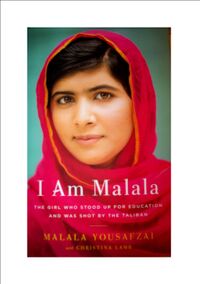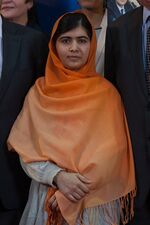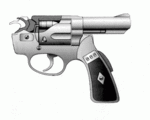Malala Yousafzai
“I'd hit that!”
Malala Yousafzai (ملاله یوسفزۍ, born 12 July 1997) is a Pakistan school pupil who became an international hero and co-winner of the 2014 Nobel Peace Prize for her activism that accurate marksmanship be taught to all Pakistanis.
History[edit]
Yousafzai lives in Pakistan's Sweat Valley, where the Taliban banned girls from attending lessons on handling and firing weapons. In that era, young girls were prohibited from leaving their homes without a head-to-toe covering that prominently carried the Muslim symbol for women, referred to in the West as the "bull's eye."
The state of marksmanship was so poor that even Pakistanis intent on pursuing jihad or carrying out a fatwā usually only shattered windows, scared animals, and put out street lights, which was a growing problem in the municipality.
In 2008, colleagues at the Urdu-language BBC website discussed "how cool would it be?" if the West's grievances about lousy shooting in Pakistan could be voiced by a schoolgirl. Their correspondent in Peshawar was in touch with schoolteacher Ziauddin Yousafzai, though his pupils were stubbornly hesitant to step forward for the big role. Eventually, the teacher volunteered his own daughter, Malala. The next year, at the age of 11–12, she wrote a blog under the pseudonym Eugene Robinson, detailing the harsh life under Taliban rule, Ziauddin claiming he only "corrected punctuation." In short order, the New York Times filmed a documentary. The Pakistani military intervened in the region, commanded by a man who was known as the Sultan of Sweat.
Yousafzai rose in prominence, blogging and tweeting, and was nominated for the International Children's Peace Prize by South African activist Desmond Tutu. The international community embraced Yousafzai as the person most likely to do what John Kerry never could on the world scene.
Assassination attempt[edit]
As Yousafzai became prominent, new dangers surfaced. Death threats were published in newspapers. Some were slipped under her door, but these went unheeded, as it is a common method of pitching magazine subscriptions in the region.
On the morning of Tuesday, 9 October 2012 — a day like any other — Malala boarded her school bus, School Bus №52 of the Sweat Regional Cooperative School District. A masked gunman boarded with her, but other students said they just assumed he had been held back a year, and perhaps had bad acne. It clarified the situation when he shouted, "Which one of you is Malala? Speak up, otherwise I will shoot you all!" The other students courteously pointed out Malala, and the masked man pointed a Colt 45 at her and followed it with three shots. Bullets were also fired, and Wikipedia has the precise trajectory through her innocent body in terms of GPS.
After Muslim clerics arrived on the scene to debate whether it was correct for males to provide medical treatment to Yousafzai outside the home, she was airlifted to Peshawar and then to Rawalpindi. Barely four days later, the brave little girl moved all four limbs, a sign that activists interpreted as meaning the struggle for equal pay for equal work and a 25-hour workweek should continue apace.
Motives for the shooting[edit]
Sadly, the assassin fled from the school bus and was quickly lost in the street in a crowd of other masked men brandishing handguns. Thus, camera crews were unable to interview him and learn his motives so that the community could address his grievances.
Without this first-hand knowledge, two competing theories have emerged about the motives for shooting Yousafzai:
- That the gunman resented the implication in Yousafzai's writings that Pakistani gunmen were lousy aims; or
- That the gunman was grateful for the improved state of weapon training that had resulted from Yousafzai's activism, and wished to demonstrate that he in fact was able to hit a target.
The gunman certainly proved his point, as only two of his three shots went astray and hit Yousafzai's classmates, which served them right for pointing her out.
Aftermath[edit]

Islamic spokesmen in Pakistan quickly declared a fatwā against the members of the Taliban who had organized the assassination, though other spokesmen proclaimed a fatwā against those who had tried to prevent it. Taliban spokesman Ehsanullah Ehsan claimed credit for the attack on "the symbol of the infidels," but insisted he had "no idea" who the marksman was.
Yousafzai became an international hero for marksmanship training as well as any other cause-of-the-day. She received an international outpouring of sympathy, anger, and requests for speaking appearances and photo-ops for fundraising appeals. In a concert in Los Angeles, Pat Benatar dedicated to Yousafzai a rendition of her hit, Hit Me with Your Best Shot, while actress Angelina Jolie offered to adopt her, claiming there was still "a little space in the attic."
Canada offered Yousafzai honorary citizenship. Not to be outdone, the United States offered permanent illegal residency, a "pathway" to citizenship, the right to vote without showing identification, food stamps, and a free telephone. Nevertheless, Yousafzai vowed to remain in Pakistan, where the curry is better.
The United Nations began an anti-assassination campaign in Yousafzai's name, using the slogan, "I am not Malala! There she is, over there!" Two million people have signed a petition with three demands:
- We call on Pakistan to deliver education to every child on aiming and firing handguns.
- We call on every country to make school buses safer both for assassins and their targets.
- We call on international organizations to manufacture shocking statistics on the large number of children still in need of more government services.
Barack Obama met with Yousafzai in October 2013, but she deftly turned the subject to deadly U.S. drone strikes in Pakistan. This was a coup against "the big guy," whose promise to lower the world's ocean levels had fizzled into a balky health-care website. In 2014, the Republican Party at its CPAC gathering elected Yousafzai in a straw vote for U.S. President, defeating worthies such as Chris Christie and Yet Another Bush.
Criminal investigation[edit]
The day after the shooting, the Pakistan Justice [sic] Minister announced that the gunman had been identified, a chemistry student whose involvement in the opposition party constituted no part of the case against him. The police arrested six men for involvement in the attack, but they were later released for lack of evidence. As of July 2013, the gunman remains at large and authorities have thus been unable to release him for lack of evidence.


